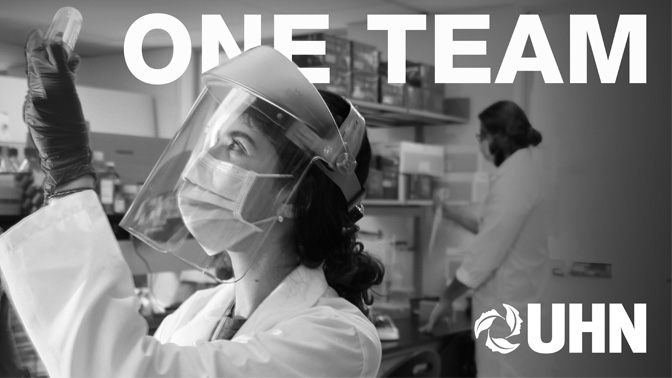
During this unprecedented year, TeamUHN has made extraordinary progress in discovery and innovation. Read about this progress in the latest research report, which is titled One Team.
Despite the initial suspension of research, staff reassignments and a shift in research focus to address the urgent need to understand SARS-CoV-2 and COVID-19, each department persevered to continue to advance health research.
And we did it all as a team.
Collaborations emerged across our institutes, departments and hospitals to address the world’s most challenging health problems. With the support of the Technology Development & Commercialization office, UHN achieved important commercialization milestones and moved discoveries from the lab to clinical settings to benefit patients. UHN also made a commitment to a more equitable, diverse and inclusive culture and is taking steps to integrate these principles into research to create an even stronger community.
The latest report showcases this dedication to advancing discovery and innovation across UHN’s seven research institutes, as illustrated in the following feature stories:
- Krembil Research Institute: researchers identified a protein, known as VLK, that guides neuron growth and connectivity and could be key to brain development, function and disease
- McEwen Stem Cell Institute: a realistic experimental heart model was used to reveal ways of overcoming current hurdles in the use of stem cells to repair damaged hearts
- Princess Margaret Cancer Centre: cutting-edge pathology and sequencing technologies were used by researchers to identify new subtypes of pancreatic cancer
- Techna Institute: computational approaches were used to identify the benefits and potential to save lives in Ontario by optimizing the location of automated external defibrillators
- The Institute for Education Research: UHN’s newest research institute was launched with a focus on developing new models of learning for health care for researchers, educators and caregivers
- The KITE Research Institute: a video-monitoring system was developed to help prevent falls in people with dementia
- Toronto General Hospital Research Institute: researchers revealed that a pill form of a drug to treat type-2 diabetes that can replace injections was safe for use by patients
Also featured are UHN’s three foundations—The Princess Margaret Cancer Foundation, Toronto General & Western Hospital Foundation and Toronto Rehab Foundation—through stories that reflect on a year of successful funding endeavours and share how donor support has changed the lives of patients and their families.
Click here to read this year’s report. To view previous reports, see our archive.




